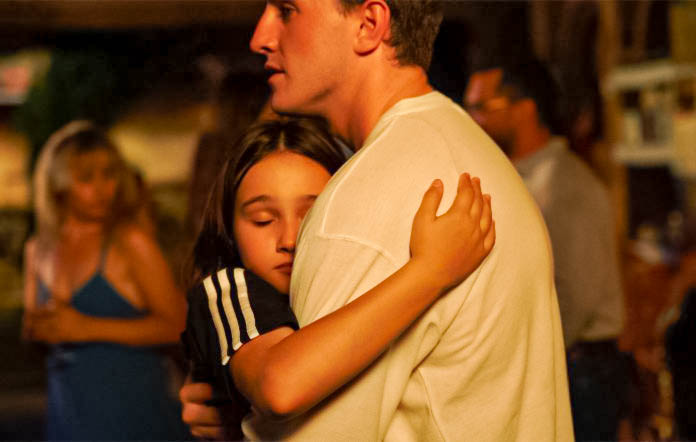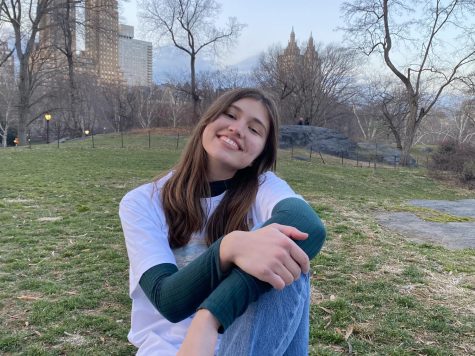A Review of Charlotte Wells’ Debut Film “Aftersun”
March 23, 2023
Spoilers for “Aftersun” (2022)
CW: Self-harm
In the wake of the recent Oscar nominations, the severely underrated film “Aftersun” has been gaining some much deserved attention. A24’s “Aftersun” is written, directed and produced by the multi-talented Charlotte Wells, leading her to win the award for Outstanding Debut by a British Writer, Director, or Producer during the BAFTA Awards.
The film follows a father and daughter duo, Callum (Paul Mescal) and Sophie (Frankie Corio), told predominantly from Sophie’s point of view as she reflects on a trip they took together to a resort that ended up being some of the last moments they spent together. Although mostly from young Sophie’s point of view, there are many scenes of adult Sophie physically looking back at her memories through old video tapes as well as scenes outside of Sophie’s memory that reveal more about Callum’s true suffering.
Inspired by Wells’ own experiences with love and loss, the film feels as if she took all the painful emotions bound up in those experiences and made them into one singular evocative work of art. This was one of those movies that is such a close representation of real life that it feels so painful but in such a beautiful way. It is a devastating culmination of nostalgia, heartbreak, love and regret.
The film covers a mature topic through the perspective of Sophie as an 11-year-old girl just at the brink of reaching adolescent maturity. Her innocent perspective creates a beautiful contrast between young Sophie’s hopeful perspective on the future, and Callum’s difficult relationship with both his future and his past as he struggles with depression. Sophie observes the older kids at the resort with envy and intrigue, and experiments with sexuality for the first time, viewing her life ahead of her as something exciting and beautiful. Callum on the other hand anticipates his approaching birthday with dread and fear. Although she shows some signs of understanding of her father’s state, for the most part Sophie remains oblivious to her father’s struggles with mental health, which he purposefully hides from her.
Wells plays on this contrast in perspective through her framing, with some scenes literally separating Sophie and Callum. One scene shows Sophie and Callum on opposite sides of a wall. Sophie asks Callum questions, her father on the other side having just accidentally cut himself but not wanting to reveal his pain to her. Although spatially right next to each other, the wall separates them. On the side of the wall where Callum sits the colors are cool blue hues, while the side Sophie sits has warm yellow colors. This contrast is both a good representation of where the two characters’ mindsets are, as well as a valuable form of characterization. The fact that Callum decides to conceal his physical pain from his daughter represents how Callum also conceals his struggles with mental health, allowing Sophie to live in childhood ignorance.
The film is overall slow-moving, portraying mundane and simple moments the two share during their vacation. Wells pays intense attention to detail with every shot, but I found that this added to the idea of Sophie reflecting on her past, clinging to every little detail in order to form some sort of explanation. These long shots also allow viewers to learn a lot more about Callum, as Mescal’s portrayal of signs of depression were rarely overt, especially not to his daughter. One shot that portrayed this effect was an objective retelling of a moment when Callum becomes intoxicated one night and runs into the ocean alone. The shot stands still as Callum walks into the ocean and eventually disappears into the darkness, leaving only the sound of crashing waves. The shot carries on for so long to the point that viewers may speculate if Callum survives this moment. It leaves a hauntingly ominous feeling for the rest of the film, as more and more of Callum’s reality gets revealed.
One thing I really appreciated about this film is how there is no doubt about the strong bond between the two main characters. There is clearly so much love from both sides, which makes the experience of death so much more tragic and hard to understand. It’s really accurate to how one would grieve someone who took their own life, struggling to piece together what led to this and how it could have been avoided. Both Mescal and Corio’s performances deserve recognition as their chemistry creates a world that feels profoundly realistic in an everyday sense, while still accurately portraying complex human experiences of pain and love.
The ending scene is by far the most impactful, bringing together subtle themes from throughout the film. Wells uses this dreamlike visualization with Callum dancing in a dark space with flashing lights to represent her memories of him, having brief interruptions of scenes with images of Callum dancing under disorienting strobe lights. The ending scene ties this together with a long scene in this abstract rave style that mixes Sophie’s past and present relationship with her father through her memories.
The scene is accompanied by the song “Under Pressure” by Queen and David Bowie. The song is a perfect choice for this moment, especially with the adjustments they made for the scene, removing some of the original instrumentals and adding the same ominous musical score used throughout the film. This adds much more emphasis on Freddie Mercury’s eerie vocal range and Bowie’s building vocals during the outro, like the scene is building towards a final climax. Since the sequence is meant to represent Sophie’s confrontation with the memory of her father, it makes for a perfect representation of how it feels to battle a difficult memory just out of grasp. The scene ends with the lyrics “This is our last dance, this is ourselves” directly describing the way this was Sophie’s last dance with her father.
Ultimately, this film has deserved every bit of attention it has gotten from film festivals and award shows alike. Films like this remind film lovers of the value in independent filmmaking, rethinking conventional narrative forms and allowing for a focus on emotion and detail over entertainment. There are so many beautifully curated shots and moments in this film that can only be understood by watching it in its entirety. This will definitely not be the last award winning film we see by Wells. I highly recommend this film, however, be ready to have your heart torn to pieces.













